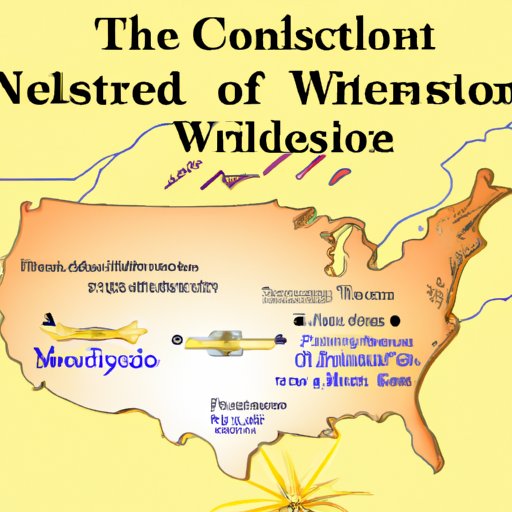Introduction
The 19th century saw an unprecedented wave of people leaving their homes in the east to travel west. This massive movement of people, known as westward expansion, was driven by a variety of factors. From the discovery of gold to the promise of religious freedom, there were many motivations for people to uproot and move to the unknown region of the American West. In this article, we will explore some of the most influential factors that drove people to make the journey west.
The Impact of the Gold Rush and Land Availability on Westward Migration
One of the primary drivers of westward migration was the discovery of gold in California in 1848. The news quickly spread throughout the United States and soon thousands of people from all over the country had made their way to the Golden State in search of riches. This period is known as the California Gold Rush and it had a profound effect on the population of the West. The influx of prospectors and entrepreneurs seeking their fortune brought a huge influx of wealth and resources to the region. This created economic opportunities that were simply not available in the east and helped to spur further migration.
In addition to the Gold Rush, another important factor that encouraged people to move west was the availability of land. The Homestead Act of 1862 allowed settlers to claim up to 160 acres of free land if they could prove that they had improved the property. This act opened up vast tracts of previously untapped land and allowed people to start anew with the promise of economic stability.

Exploring the Economic Benefits of Moving West
The economic benefits of migrating west were numerous. One of the most attractive aspects was access to resources. Many easterners moved west in order to take advantage of the abundance of timber, minerals, and fertile soil that could be found in the West. These resources provided settlers with the opportunity to build homesteads and establish businesses that could provide them with a steady income.
In addition to access to resources, many people were also drawn to the West by the potential for economic success. With the expansion of railroads and industry, the West became a hub of economic activity. People saw the potential for financial success and migrated west in hopes of striking it rich. This combination of resources and opportunity meant that westerners had a better chance of achieving economic prosperity than those who stayed in the East.
Examining the Attraction of a New Frontier: Adventure and Opportunity
In addition to the economic benefits of moving west, there was also the allure of a new way of life. For many, the idea of starting fresh in a new place was too tempting to ignore. The West offered the promise of adventure and the possibility of a better future. This drew people from all walks of life, including farmers, ranchers, miners, and merchants. The concept of a new frontier was attractive to those who wanted to escape the confines of the more traditional eastern society.
The West also offered social mobility. People from all backgrounds had the opportunity to make something of themselves. This was especially true for immigrants and minorities who often found themselves discriminated against in the East. The West offered them the possibility of a new beginning and the chance to create a better life for themselves and their families.

Analyzing the Role of Religion in Westward Expansion
Religion also played an important role in the decision to move west. Many settlers were motivated by the promise of religious freedom. The West was seen as a haven for those of different faiths who were persecuted in the East. Additionally, many missionaries moved west in order to spread their faith among the native populations.

The Role of Political Conflict in the Decision to Move West
Political conflict also contributed to the decision to migrate west. The displacement of Native American tribes due to government policies, as well as border disputes between states, prompted many people to seek a new home in the West. This political turmoil added to the already existing motivations of economic opportunity and religious freedom.
Conclusion
In conclusion, there were a variety of reasons why people chose to leave the East and travel west during the 19th century. Economic opportunities, religious freedom, and the promise of a new life all played a role in the decision to migrate. The Gold Rush and the availability of land also contributed to the mass movement of people to the American West. As we can see, each individual’s motivation was unique, but the result was the same: a new beginning in a new land.
(Note: Is this article not meeting your expectations? Do you have knowledge or insights to share? Unlock new opportunities and expand your reach by joining our authors team. Click Registration to join us and share your expertise with our readers.)
